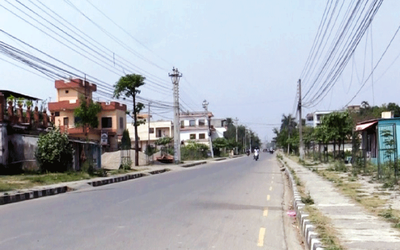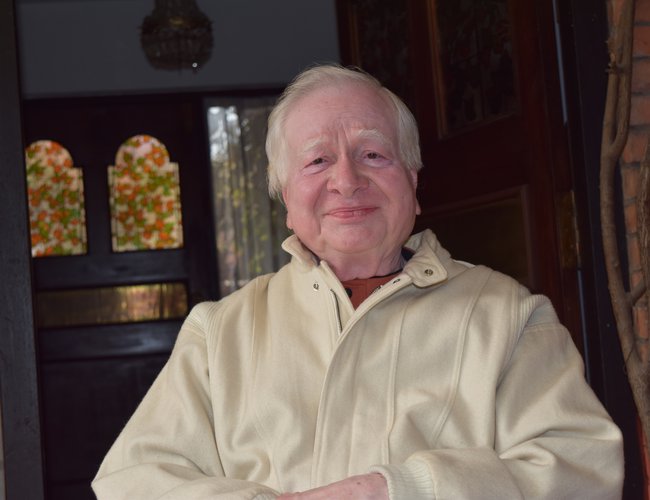
For any successful diplomat, he or she wishes to see some high level visits taking place during their tenure. However, only a few diplomats can achieve this. For a diplomat of smaller countries like Nepal, organizing high-level visits is a miracle.
In the career of former ambassador and secretary Narayan Prasad Arjal, his wish came true. As the Nepali ambassador to Japan, 1985-1991, Arjal was successful to organize two high level visits in Nepal and Japan. Ambassador Arjal had successfully handled the state visit of King Birendra in 1985 in Tokyo. Similarly, he also organized a visit of Emperor Naruhito’s visit to Nepal as a crown prince in 1987.
Not only this, former ambassador Arjal also persuaded Japan to increase its financial aid to Nepal to build infrastructure in health, education and road. It was during his tenure as ambassador of Nepal, Japan increased aid to Nepal by many folds.
As a saying goes one gets what he deserves, Arjal was recognized by government of Japan for his valuable contribution 33 years after his work. Arjal received Order of the Rising Sun from Government of Japan for his contribution in strengthening Nepal-Japan relations.
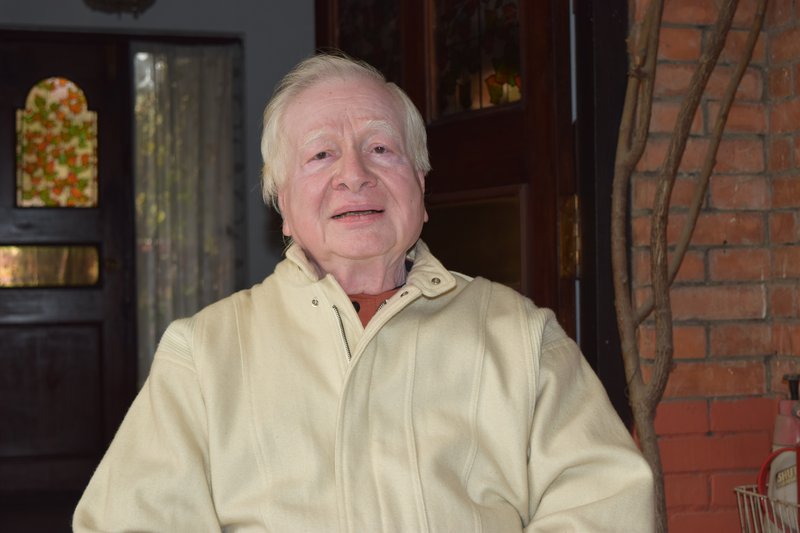
"I am very much obliged to the Government of Japan for such a high level recognition. The recognition itself is a great thing. The medal also adds responsibility upon me to further strengthen our relations,” said Arjal, founder of Morang College (currently Mahendra Morang Campus).
Quietly living in his own house in Gyaneshwor with the photos hung in the wall of his living room, reminding his hay days in Japan, former ambassador Arjal, who has made many valuable contributions to Nepal in various capacities in the sectors including education, bureaucracy and foreign service, considers Nepal-Japan relation is natural and deeply rooted in the people.
“Our relation is unique and it is deeply rooted in the people. The visit of current Emperor Naruhito as a crown prince in 1987 takes Nepal-Japan relations to a new height,” said ambassador Arjal.
Arjal remembered his days as ambassador of Nepal to Japan as very significant. “I interacted with different levels for the benefits of Nepalese people and society,” said Arjal, who was a part of Emperor Naruhito’s visit to Nepal as a Crown Prince. “Like his father, Emperor Naruhito loves Nepal as he was impressed by Nepal’s nature.”
With his own personal level interaction, he pursued Japanese officials to increase aid to Nepal’s health, road, hydropower, agriculture and other infrastructure sectors. During 1990s Japan’s was Nepal’s number one development partner supporting various sectors.
Appointed ambassador of Nepal to Japan and Australia just a week before the visit of King Birendra to Japan and Australia, Arjal moved from one end of Pacific to the other end to present his credentials and was formally included in entourage. “It was hectic as palace secretariat informed my appointment at the last minute of the visit of King Birendra,” recalled Arjal. “It was such a hurry that I presented my credentials in a rush.”
As a career diplomat of Ministry of Foreign Affairs, ambassador Arjal handled the visit successfully by overcoming all the challenges. “As ambassador of Australia and Japan, I was part of both the visits. I am happy to say that King’s visit to Japan was highly successful to further strengthen our relations.”
As Nepal and Australia celebrated 60 years of establishment of diplomatic relations this week, Ambassador Arjal was the first ambassador to pave way for the first state visit of Nepal’s head of the state.
Turning Point
Founder of Morang College (Mahendra Morang College Now) of Biratnagar with affiliation to Patna University, Arjal later entered civil service in 1959 as a cadre of Ministry of Foreign Affairs. “After establishing Morang College, I decided to quit education sector. I came to Kathmandu to meet Prime Minister B.P. Koirala,” said Arjal.
His meeting with Koirala was followed by interesting events. Had he not come on his scooter, Koirala would not distinguish him from the other person with the same name. “I still remember the incident when I sent my name in a chit requesting the meeting. Expecting I was someone else by the name of Narayan, BP just ignored the request. However, Bishwobandhu Thapa, who learned that the man wanting to see BP Koirala came on a scooter, intervened and asked the guard to bring me up. I had come to Kathmandu on a flight taking my scooter with me expecting that it will make my visit to Kathmandu convenient and easy,” recalled Arjal. “During the period, there was no public transport including taxi in Kathmandu.”
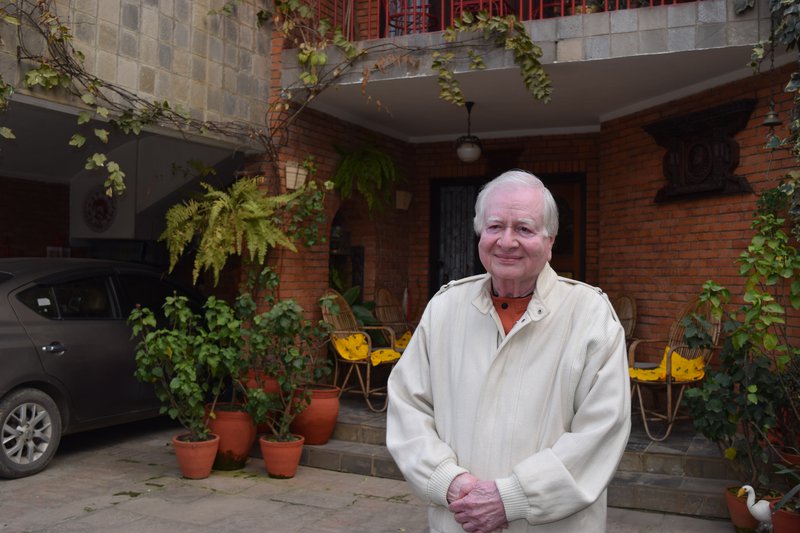
However, this reluctant meeting remained a turning point in the life of Arjal. Knowing each other well since the revolution of 1950s, BP offered a job to Arjal in education. However, he declined it and expressed his interest to serve in Foreign Ministry. “Koirala accepted my request and offered a job in Foreign Ministry,” Arjal recalled.
His first meeting paved a way for him to join the Ministry of Foreign Affairs and changed his career from Principle of a college of eastern Nepal to bureaucrat. He has the memory of working with late Narendra Mani Dixit, Padma Bahadur Khatri, Pradumna Lal Rajbhandari and Nara Pratap Thapa of yesteryears.
Arjal’s Life
Born in Biratnagar in 1933, he participated in the revolution of 1951 as a young activist fighting in Janakpur and Siraha fronts under the banner of Nepali Congress.
Arjal’s personal life has some vivid but interesting experience. He completed his Master’s Degree from Lucknow University at the age of 22 and became the founder principle of Morang College of Biratnagar.
It was the first private college in Nepal and second college for higher education in Nepal. At the age of 26, Arjal joined Ministry of Foreign Affairs. He was first secretary at Royal Nepalese Embassy in Washington and Permanent Mission of Nepal to United Nations New York in 1960-1961. He served as the first secretary in London in 1964-1966, Chief of Protocol and counselor and DCM in Royal Nepalese Embassy in India.
He was promoted to secretary at the age of 41 in 1973 and retired from the civil service in 1979 at the age of 46. Interestingly, he moved from one to other ministry later to retire at the age of 46 from the Ministry of Transport and Works. However, Arjal’s career ended as the Royal Nepalese Ambassador to Japan, Australia, New Zeeland, Republic of Korea and Fiji in 1991 at the age of 58.
Known for his strong commitment to his work and decisive nature, he took several important decisions which helped Nepal in the process of transformation. Laying the foundation of many institutions currently in operation, Arjal was bold and frank in dealing with the issues related to his work.
The strength of Arjal was his experience of working in different ministries. Having served key ministries like tourism, transport and foreign affairs, Arjal knew the priorities and needs of Nepal and his experience with ministry of diplomacy helped him to deal with the diplomatic task.
Thanks to his efforts, Japan agreed to support Tribhuwan University Teaching Hospital and Banepa-Bardibas Road, one of the highly aided projects by Japan in any country of the world.
In his career, Arjal received several medals and rewards in Nepal and other foreign countries. He values the recent medal given by Japan, recognizing him for his service in strengthening the relations between Nepal and Japan, a lot.
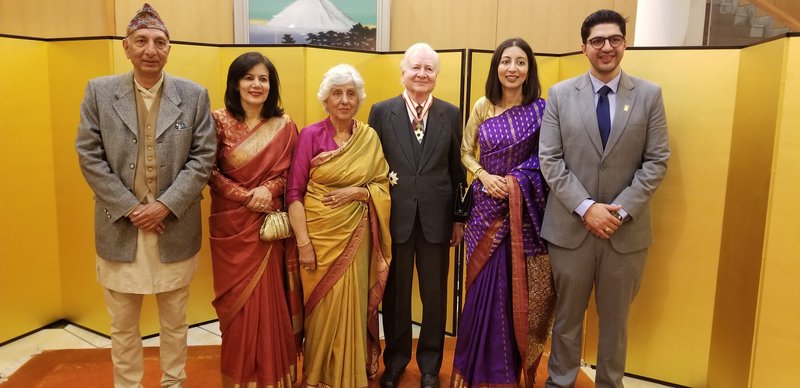
Nepal’s Transformation
The present transformation is dramatic for a person like Arjal, who first entered Kathmandu from Biratnagar securing visa in Birgunj in 1948. Isolated from the rest of the country, Kathmandu Valley’s life used to be different than the rest of the country.
"We used to need a visa to come to Kathmandu and visa to exit from Kathmandu till 1951. For people like us from Biratnagar, Nepal meant Kathmandu," Arjal recalled Nepal of seventy years ago.
Arjal has seen many ups and downs in Nepalese society and governance system. From controlled Rana Regime to open democratic system following the revolution of 1950s and the current stage of transition to republican, Arjal is an eye witness of political and social changes.
Remembering the old civil service days, he said there was a high sense of morality and ethics in civil servants. “With the exception of a few incidents, what I claim is that the bureaucrats are honest with high dignity,” said Arjal.
Family Affairs
Although he joined the revolution under the guidance of Nepali Congress and his family has ties with politicians, with his sister Lila Koirala married to Nepali Congress stalwart late Saroj Koirala and niece with NC leader Dr. Shekhar Koirala, Arjal is independent in thinking and maintaining his own neutrality in entire career.
“I don’t choose this or that political ideology. I always maintain my neutrality. This was the reason I survived even the hard days of Panchayat,” said Arjal. Arjal did not face any discrimination even during Panchayat Days in civil service. He joined foreign service during the prime ministership of B.P. Koirala and continuing his service till the return of Nepali Congress government in 1991. “I do believe in neutrality of civil service," said Arjal.
Living with a family of six including his wife, son, daughter-in-law and two granddaughters, Arjal has a set routine of his life. His daily chorus begins early in the morning. After searching for various international news channels and listening to the contemporary politics, he goes to bed.
With one grand-daughter Dr. Niyukty Arjal completing MDS and practicing dentistry and another granddaughter Nischala Arjal completed Master in Law from the Netherlands; Arjal has a caring wife Nirmala Arjal, son Nalim Arjal and daughter in law Manju Arjal. His elder granddaughter Dr. Niyukty Arjal married to Shabda Gyawali.
Walking an hour every morning, Arjal is physically fit. “My health is perfect ant I don't have any health problem till now. It is my big asset," said Arjal, who avoids parties and reception.
"I have been enjoying my life within my own periphery of the house," said Arjal. “He has been in pension since 1979 as he is the lonely one among his contemporary to receive the pension.”
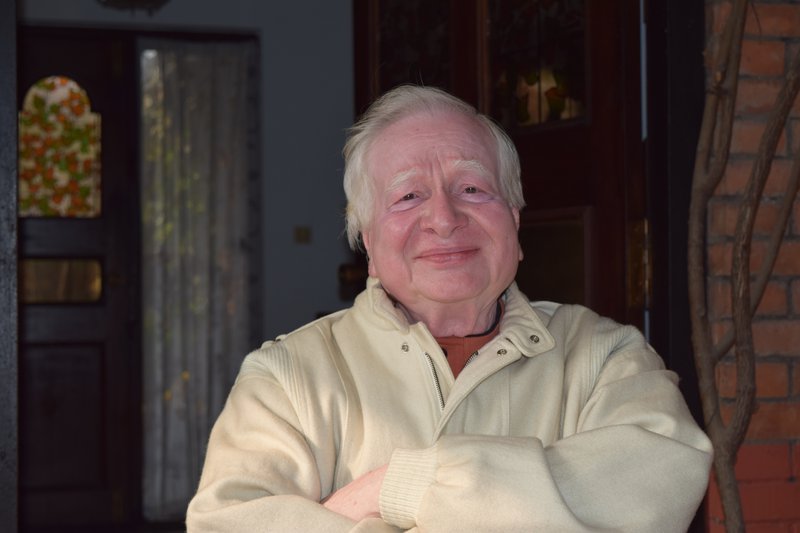
Civil Service
Joining civil service through the Ministry of Foreign Affairs, he retired as a secretary of Ministry of Works and Transport. "During that time, there were provisions in the civil service to transfer joint secretary and secretary in any ministry," said Arjal.
Serving as the first secretary in Royal Nepalese Embassy, Washington DC, and Permanent Mission of Nepal to the New York from 1959-1960, Arjal’s innings in the foreign ministry was long. He served as the first secretary to the Royal Nepalese Embassy in London from 1964 to 1966 when Late King Birendra went to Eton college. From being Chief of Protocol of Ministry of Foreign Affairs, he served as the Counselor (DCM) in Royal Nepalese Embassy in New Delhi from 1967 to 1972.
In 1973, he was transferred to be the Director General of Department of Tourism and later work as a secretary of Ministry Work and Transport from 1974-1979. During his tenure, Hetauda-Narayanghat Road construction began with the loan from Asian Development Bank.
This was a major infrastructure project supported by Asian Development Bank. Due to some individual vendetta, he was suspended for a few months by opening the big funding of Asian Development Bank in infrastructure project in Nepal.
"As I have done nothing wrong, I fought tooth and nail against the conspiracy hatched against me. Finally, the court gave me a clean cheat the day when I had to get mandatory retirement."
Japan’s Award
Arjal, who is among this year’s foreign recipient in recognition of his contributions towards strengthening the relationship between Japan and Nepal, received the Order of the Rising Sun, Gold and Silver Star.
The Ambassador of Japan to Nepal Masamichi Saigo handed over order of Japan to former Ambassador of Nepal to Arjal amid a function at ambassador’s residence.
Arjal contributed to the promotion of friendly-relations between Japan and Nepal by strengthening economic cooperation with Japan in medicine, infrastructure and other areas, moreover by connecting the Royal Family of Nepal and the Imperial Family of Japan as well as local municipalities of both countries. He also made contributions for the Nepali pavilion at the Tsukuba Expo of Science and Technology in 1985 and at the Osaka Expo of the International Garden and Greenery in 1990.
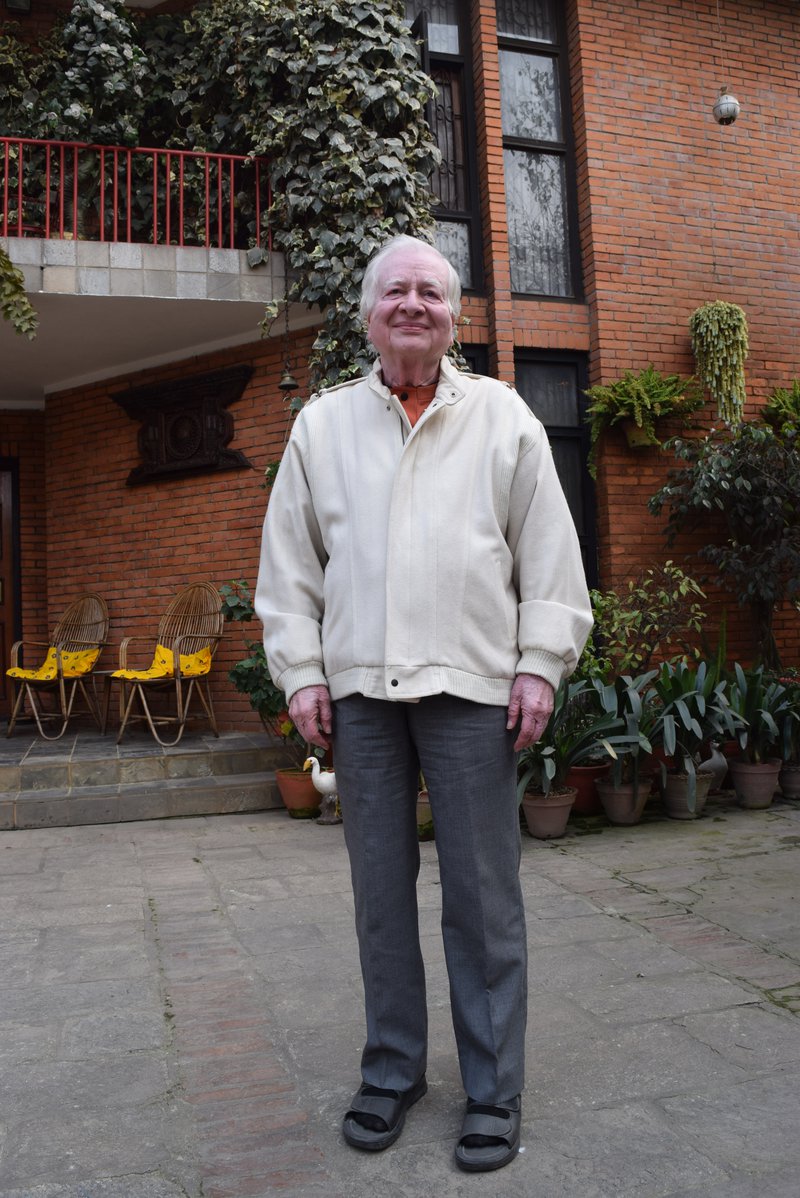
Japanese Decorations are conferred upon foreigners twice a year, on 29th April and 3rd November concurrently with the conferment of decorations and medals to Japanese nationals.
The Order of the Rising Sun is bestowed upon individuals of merit, in recognition of their outstanding contribution to the nation or public, they also conferred upon foreign nationals, who have made notable contributions to promotion of relations between Japan and other countries such as in politics and diplomacy, research and education, medicine and social welfare, economy and industry, and culture and sports.
“I am very grateful to the Government of Japan for kindly conferring on me the high decoration on the Order of the Rising Sun Gold and Silver Star,” said Arjal.
“Congrats to veteran diplomat Narayan Prasad Arjal for being chosen for award of the Order of the Rising Son, Gold and Silver Star by His Majesty the Emperor of Japan. Arjal combines unique attributes like participation in 1950 movement, entry into diplomatic service and rise in civil service as Secretary. He was ambassador to Japan for six years from 1985 to 1991. He also served as Chief of Protocol and was posted in New York, London and New Delhi. Once again, our congrats to Ambassador Arjal and Madam Nirmala Arjal,” said former ambassador to Japan Madan Kumar Bhattarai.
As it is said by Stephen Hawking, people who boast about their life are losers. As Arjal is careful not to use words to boast about him and his own personal life and his life, he always remains a winner.
Mr. Arjal understood the importance of economic cooperation between Japan and Nepal
By Masamichi Saigo, Ambassador of Japan To Nepal
This evening I have the pleasure to present Narayan Prasad Arjal, former ambassador of Nepal to Japan, with the order of the Rising Sun, Gold and Silver Star. On 3rd November last year, the Government of Japan announced its decision to confer the Order of Japan on Mr. Arjal recognizing his contribution to strengthening and promoting Japan-Nepal relations.
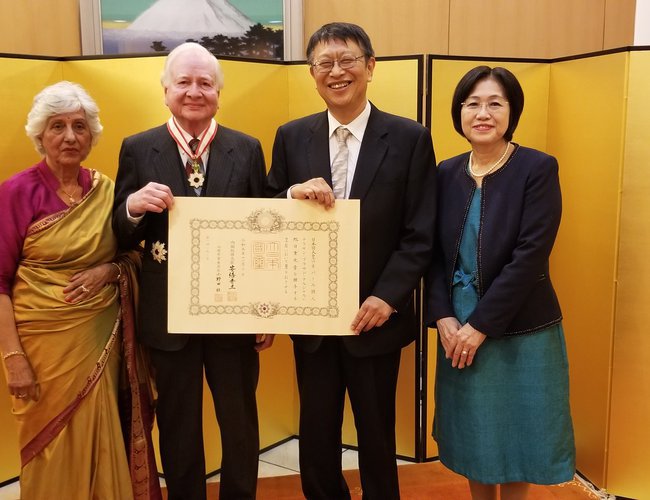
Although many of you know Mr. Arjal very well, late me briefly mention his biography and achievements.
Mr. Arjal born in Saptari obtained a Bachelor Degree from Benaras University and a Master's Degree from Lucknow University in India. One year after graduation, he became the Founder Principal of Mahendra Morang Adarsha Multiple Campus in Biratnagar which is a constituent campus of Tribhuwan University. It’s hard for me to believe that such a young person could be the principal of a campus of the most prestigious university in Nepal. He must have been an extraordinarily gifted boy! Not only clearheaded but also passionate. During his student years, he actively participated in the armed revolution in Mahotari and Dhanusha districts for the democratization of the country in 1950. He is a very idealistic and patriotic man.
Mr. Arjal joined the Nepal Foreign Service in 1959 and climbed the bureaucratic hierarchy to become a joint secretary for neighboring countries, director General of Tourism, and the secretary of the Ministry of Works and Transport. Later in 1985, he was appointed as ambassador of Nepal to Japan. During his six-year tenure, Mr. Arjal worked hard for the success of two Expos in Japan by organizing a Nepali pavilion in each. These Expos were Tsukumba Expo of Science and Technology in 1960 attended by King Birendra, and the Osaka International Garden and Greenery Expo in 1990.
Mr. Arjal understood the importance of economic cooperation between Japan and Nepal as Japan’s ODA was growing fast, in the late 1980s and Nepal needed a good health system for its people and basic infrastructure for development. Mr. Arjal met with officials from the Ministry of Foreign Affairs of Japan and JICA almost every week to bring as many ODA projects as possible to Nepal.
Among these projects, he especially focused on the modernization of the public health systems in Nepal. Under his strong leadership, Tribhuwan University Teaching Hospital and Kanti Children’s Hospital expanded. It’s not an exaggeration to say that Mr. Arjal contributed to the improvement of the public health system in Nepal. It’s also worth noting that the famous Sindhuli Road Project, which is one of the largest grants given by Japan to a foreign country and which has brought tremendous economic benefits to Nepal, started during his tenure.
I really would like to express my sincere gratitude to Mr. Arjal for your service to enhance the relationship between both countries. I also personally congratulate you on your receipt of the Order of the Rising Sun, Gold and Silver Star and wish you all the best and good health.
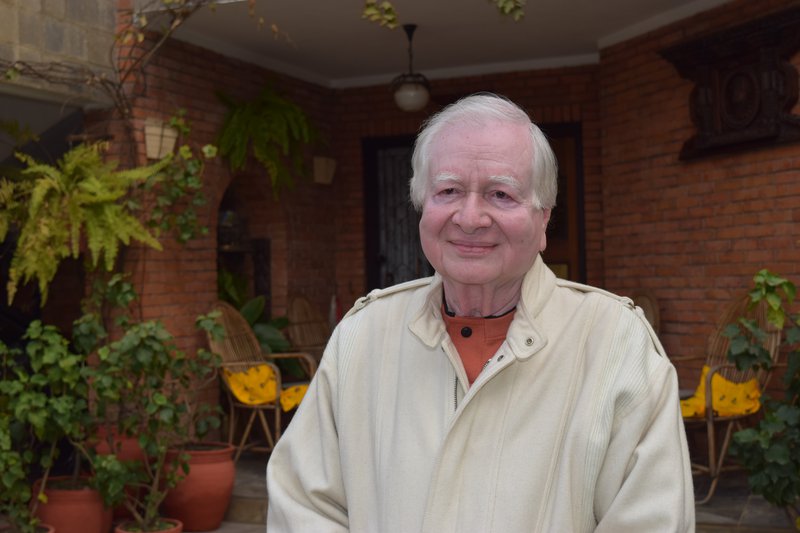

Keshab Poudel
Poudel is the editor of New Spotlight Magazine.
- IWMI: SoLAR Global Science-Policy Forum Conference
- Apr 25, 2024
- CLA: Samriddhi For Skill Development
- Apr 23, 2024
- ECONOMY: Growth At 3.3
- Apr 16, 2024
- DPM’s SHRESTHA’S CHINA VISIT High Profile, Low Key
- Apr 14, 2024
- Maha Kumbha In Barahkshetra: A Sacred Festival In Sacred Koshi (Kaushiki) River
- Apr 09, 2024










